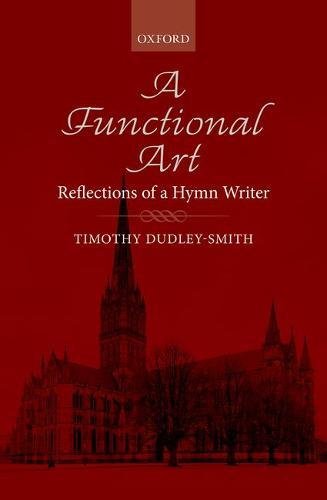A Functional Art: Reflections of a Hymn Writer
Timothy Dudley-Smith's reflections contain much of interest, but his dismissal of modern worship songs is something of a superficial caricature
 A Functional Art: Reflections of a Hymn Writer
A Functional Art: Reflections of a Hymn Writer
By Timothy Dudley-Smith
Oxford University Press
ISBN: 9780193408715
Reviewed by: Andrew Kleissner
The last half-century has witnessed a revolution in Christian congregational singing. My own experience has typified this, from a childhood dominated by Hymns Ancient and Modern and CSSM Choruses, through the heady delights of Youth Praise in my teens and first encounters with worship songs in Scripture in Song and Sounds of Living Water a few years later, culminating with the rich variety of music available today.
Timothy Dudley-Smith, the writer of Tell out, my soul and Lord of the years, has been at the very heart of this "hymn explosion". In this book he offers us his personal reflections and counsel on the hymn-writer’s craft.
As a lover of hymns, I approached this volume with anticipation. And it contains much of interest, beginning with a description of Dudley-Smith’s own career as an almost accidental hymnodist. We are given some technical analysis of hymns’ form and content and are shown why some are better than others – had you realised how the internal rhymes of O little town of Bethlehem or the unobtrusive repetitions in My song is love unknown contribute to their success? Me neither.
We learn about “gruelling”, the rigorous task of editing and refining a text until it finds its optimal form. We consider the all-important relationship between words and music: the author concludes that the text must have priority, but that it is given life by a good melody.
The author even encourages us to compare hymn-writers with the lyricists of West End shows, not necessarily to the formers’ advantage!
Yet I ultimately found this book unsatisfactory. Perhaps this is because much of it is a patchwork quilt of Dudley-Smith’s earlier writings. Perhaps it’s because the author labours some points and seems almost obsessive in his use of quotations, not just of hymns (as is only natural in a book about them!) but also taken from many writers and poets.
He struggles to shake off his public-school Anglican approach to hymns and is reluctant to recognise that many people find that their worship is enhanced by lyrics which others regard as simplistic or crude. And, although he concedes that the genre is “maturing”, his dismissal of modern worship songs is, to my mind, something of a superficial caricature. I must also say that this book’s tiny type and dull cover serve it badly.
Several books about the music we use in Christian worship have appeared in recent years: John Bell’s The Singing Thing and Nick Page’s And Now Let's Move Into A Time Of Nonsense come to mind. Dudley-Smith’s book offers a rather different perspective and, despite its shortcomings, is worth placing beside them.
Andrew Kleissner is the Minister of Christchurch United Church, Llanedeyrn, Cardiff
Baptist Times, 23/02/2018